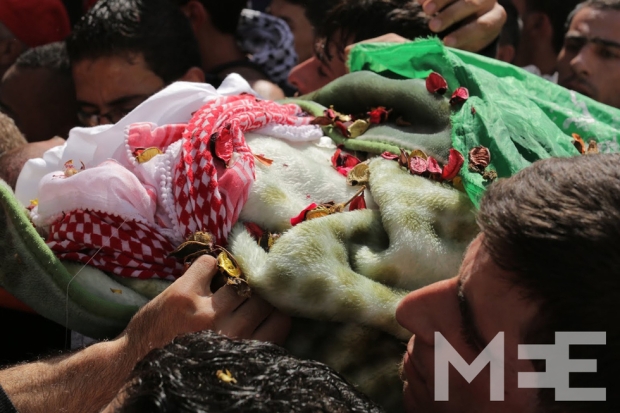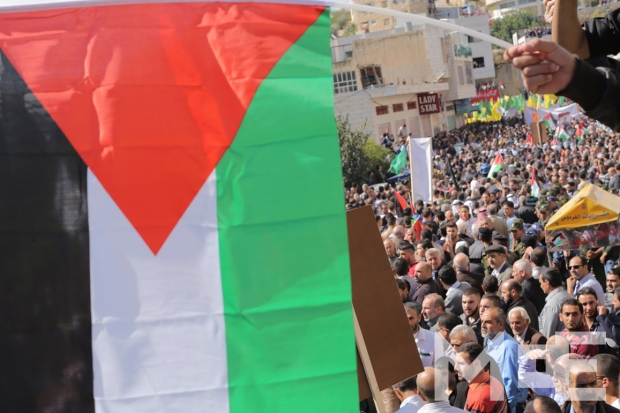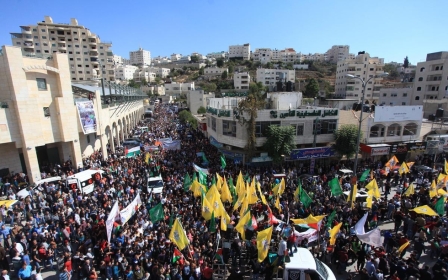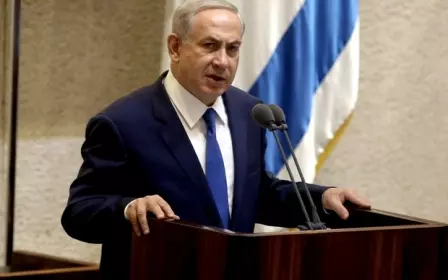Palestinians question Israel's 'knife attack' allegations after fatal shootings
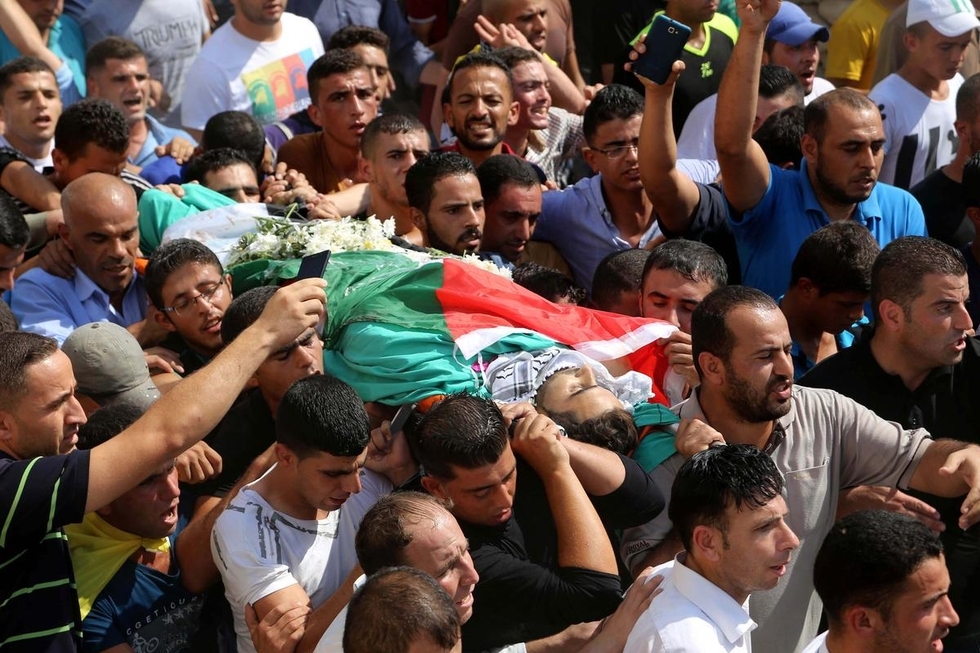
HEBRON, West Bank - Issa Amro was walking in his neighbourhood on Friday when he heard gunshots up ahead. Instead of running from the scene, like many would, Amro ran towards it.
“I got there, and there was a young man laying on the ground bleeding,” Amro told Middle East Eye as he stood in front of the large cage-like checkpoint that separates his neighbourhood from the rest of the city-centre.
The young man who lay dying or dead on the ground was 19-year-old Farouk Abdel Sidr. He was born and raised in the southern occupied West Bank district of Hebron, a flashpoint city in the current upheaval gripping the region.
Hebron is the only centre in the occupied West Bank in which Israeli settlers and Palestinian residents live side-by-side, and it is anything but peaceful. Thousands of Israeli soldiers are stationed in the area to protect around 700 Israeli settlers who, under international law, illegally reside in the city.
Young people in Hebron, like Sidr, have grown up under frequent attacks from the settler population - which is permitted to act with impunity - curfews, checkpoints, random army raids and detainments.
Israeli forces reported that Sidr was shot dead while holding a knife, about to stab an Israeli soldier near the Ibrahimi Mosque, where 29 Palestinians were shot and killed in a massacre a decade ago.
No injuries were reported as an outcome of the alleged attempted stabbing.
Amro, an engineer and coordinator of local rights group Youth Against Settlements, insisted there was no knife at the scene where the young man lay bleeding.
“I was there just a moment after the incident. I could see with my own eyes there was no knife on the ground anywhere,” Amro said.
Sidr’s uncle Abed heard the gunshots from his living room, four storeys above the scene.
“We ran to the roof to see what happened, and there was my nephew lying there,” Abed said.
Sidr’s uncle said he had last spoken to Sidr just days before. He described his nephew as an excellent student who was studying law at university. While he condemned other stabbing attacks that he admitted had taken place, he felt sure his nephew was not capable of such an act.
“I won’t say the stabbing attacks that have happened are right. I understand why desperate people living under this occupation would do such a thing, but I don’t think it is the right way to fight,” Abed said. “And I know my nephew agreed with that sentiment.”
Down at the scene of the shooting, Amro said Israeli settlers soon enveloped the area and started attacking Palestinian witnesses, who fled. He reiterated that there was no doubt in his mind that Sidr had not been intending to hurt anyone when we was shot and killed.
“It’s not the first story like this at this same place. Hadeel al-Hashlamon was killed there [in September], and it was very obvious she did not have a knife, and Fadil Qawasmi was killed near there as well [earlier this month]. Our group filmed his death, and he also didn’t have a knife,” Amro said.
‘Extrajudicial killings’
On 27 October, Amnesty International released a report that called into question a number of accounts in which Palestinians were shot and killed after alleged stabbing incidents. The group found that many of the cases, including the death of Hadeel al-Hashlamon, were extrajudicial killings.
“There is mounting evidence that, as tensions have risen dramatically, in some cases Israeli forces appear to have ripped up the rulebook and resorted to extreme and unlawful measures.” Philip Luther, Director of the Middle East and North Africa Programme at Amnesty said. “They seem increasingly prone to using lethal force against anyone they perceive as posing a threat, without ensuring that the threat is real.”
The day after the report was released, Israel’s Justice Ministry announced that 29-year-old Israa Abed who was shot multiple times by Israeli forces, but not killed, had been cleared off all charges. The court ruled that police investigations into Abed’s shooting were conclusive of the fact that she did not pose any threat when she was shot.
In the 48 hours after the charges were dropped, six more Palestinians were shot and killed.
On Wednesday, Palestinian President Mahmoud Abbas addressed the UN Human Rights Council, pleading for international protection against “extrajudicial killings”.
At least 67 Palestinians have been killed by Israeli forces in October alone. During that same time at least nine Israelis have died at the hands of Palestinian attackers.
While Amro does not discredit the fact that Palestinian stabbing attacks against Israelis have happened, he believes that Israeli forces have taken the law into their own hand and let their fear rule their actions.
“[The Israeli forces] are afraid. Their fear is making them kill without any kind of justification. They execute and then they ask questions,” Amro said. “Palestinians with knives don’t pose any threat to fully armed and protected soldiers, who are well trained to defend themselves.
“We can see so many of these cases are extrajudicial executions according to international law. In so many cases the Palestinian didn’t have a knife,” Amro added. “But even if they had a knife, it’s not an excuse to execute and kill them and to kill them in some of these cases when they are on the ground helpless.”
‘Witnesses are so important’
Two days before Sidr’s death, 23-year-old Hammam Saed was shot and killed by Israeli forces farther down the same street.
Israeli forces said Saed was shot dead after he tried to stab an Israeli soldier at the Tel Rumeida checkpoint.
The shooting happened just outside the International Solidarity Movement (ISM) home in Tel Rumeida, where volunteers said they saw whole incident.
Moments after, one of the volunteers Tweeted: “I saw everything. I saw soldiers loading the guns. He had his arms up and was shaking, he was unarmed and they just shot him."
Two activists who live at the home told MEE that the volunteers at ISM strongly believe that the stabbing attack was fabricated.
One of the volunteers, who asked to remain anonymous, said that while she didn’t see the shooting herself, as she was ducking on the ground next to the window with a few others, she trusted the eyewitness accounts of her friends and fellow volunteers who stood, watching the whole thing.
“We know what has been happening lately, and that there have been a lot of important details left out, so we know witnesses are so important,” she said, adding that in most cases in which witnesses were able to film or photograph an incident, they were able to discredit some if not all of the entire Israeli account.
(Additional reporting by Abed al Qaisi)
Middle East Eye propose une couverture et une analyse indépendantes et incomparables du Moyen-Orient, de l’Afrique du Nord et d’autres régions du monde. Pour en savoir plus sur la reprise de ce contenu et les frais qui s’appliquent, veuillez remplir ce formulaire [en anglais]. Pour en savoir plus sur MEE, cliquez ici [en anglais].


